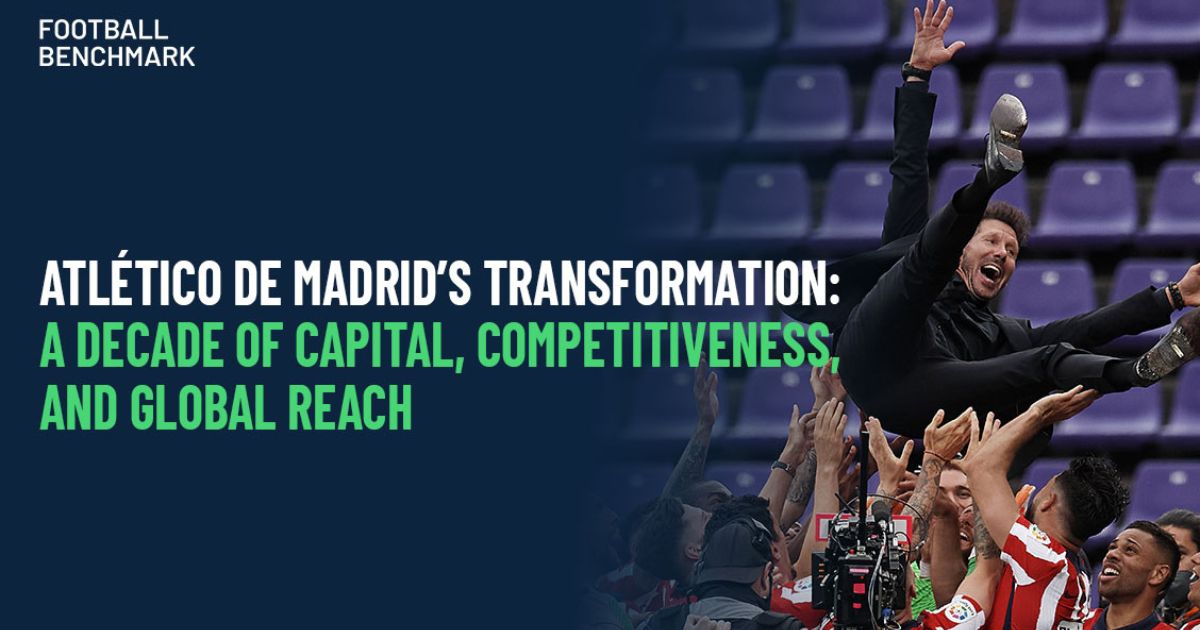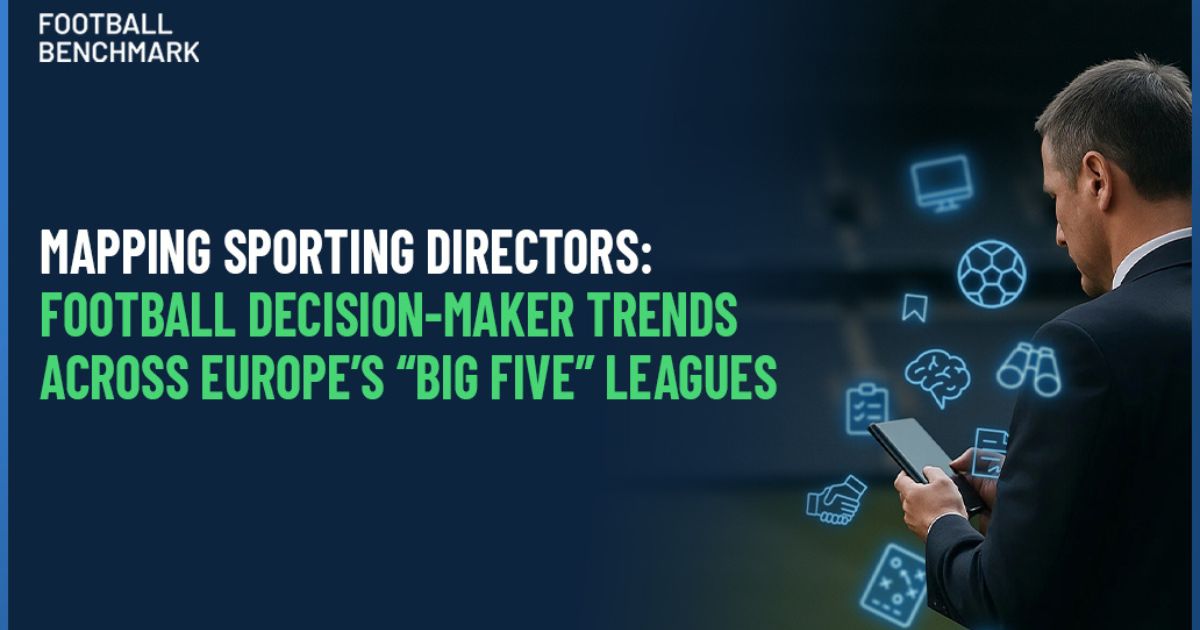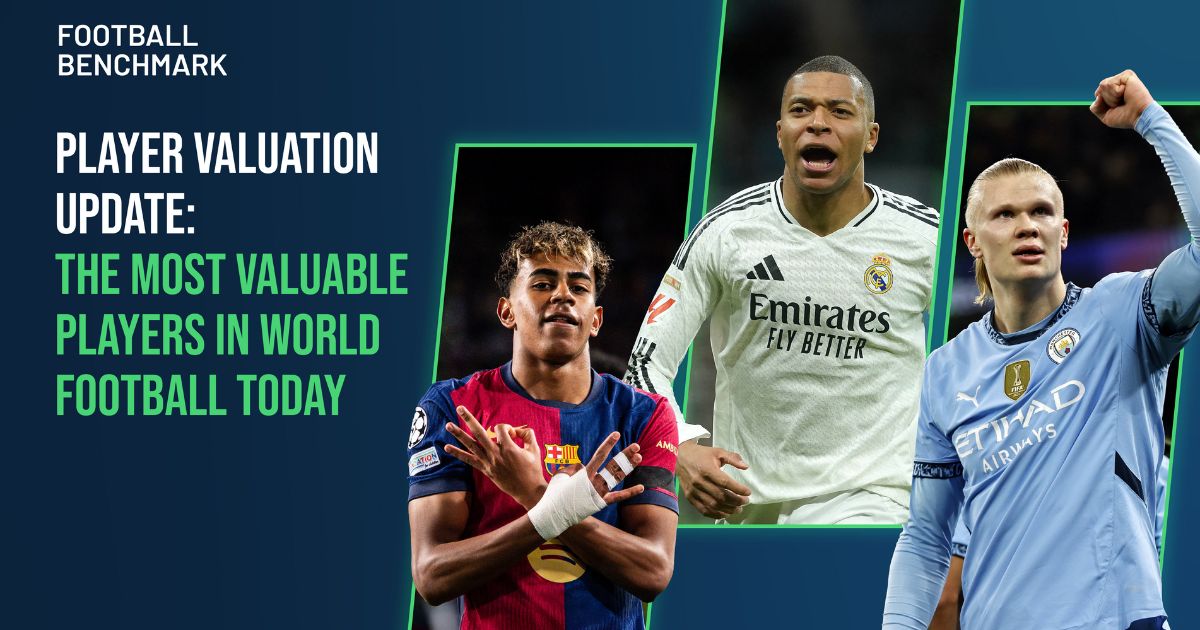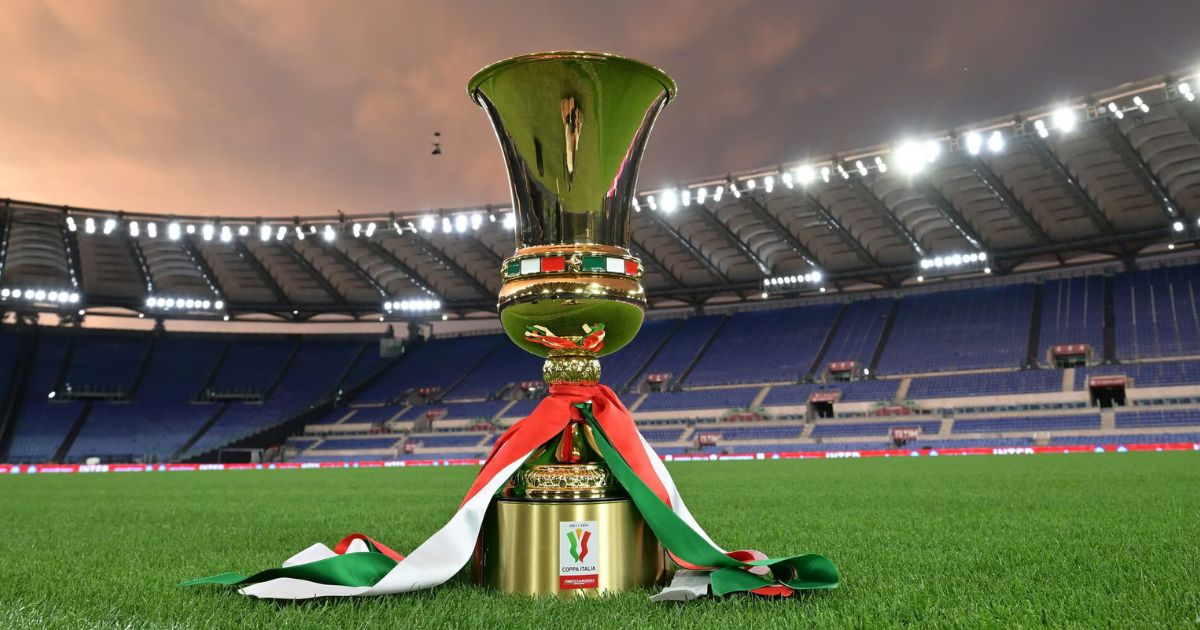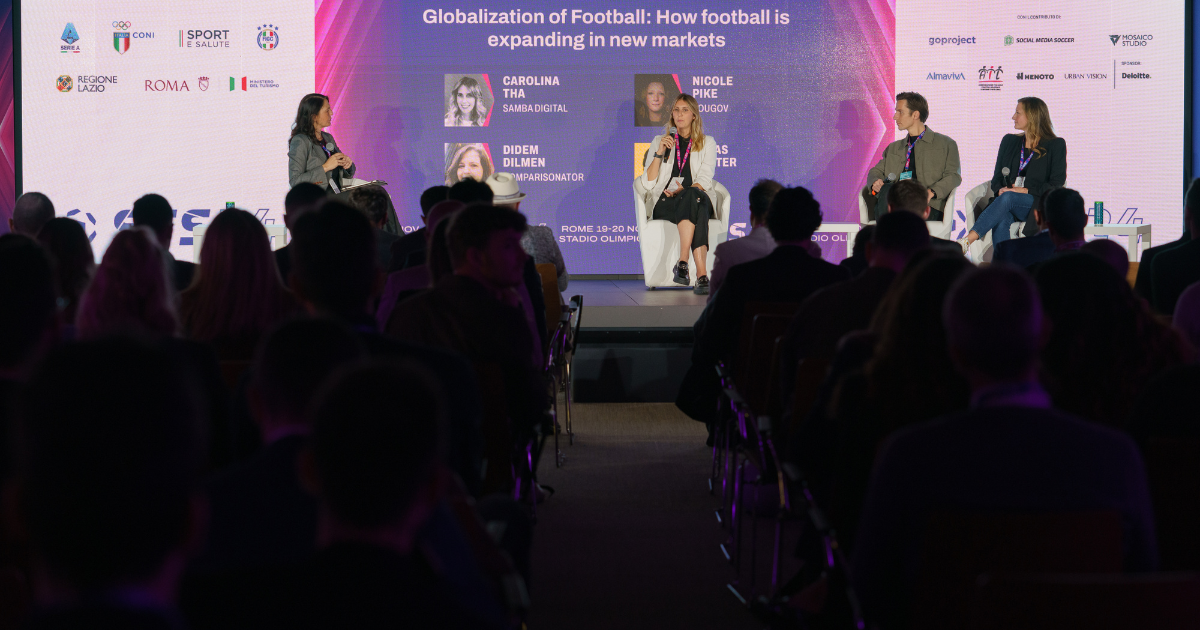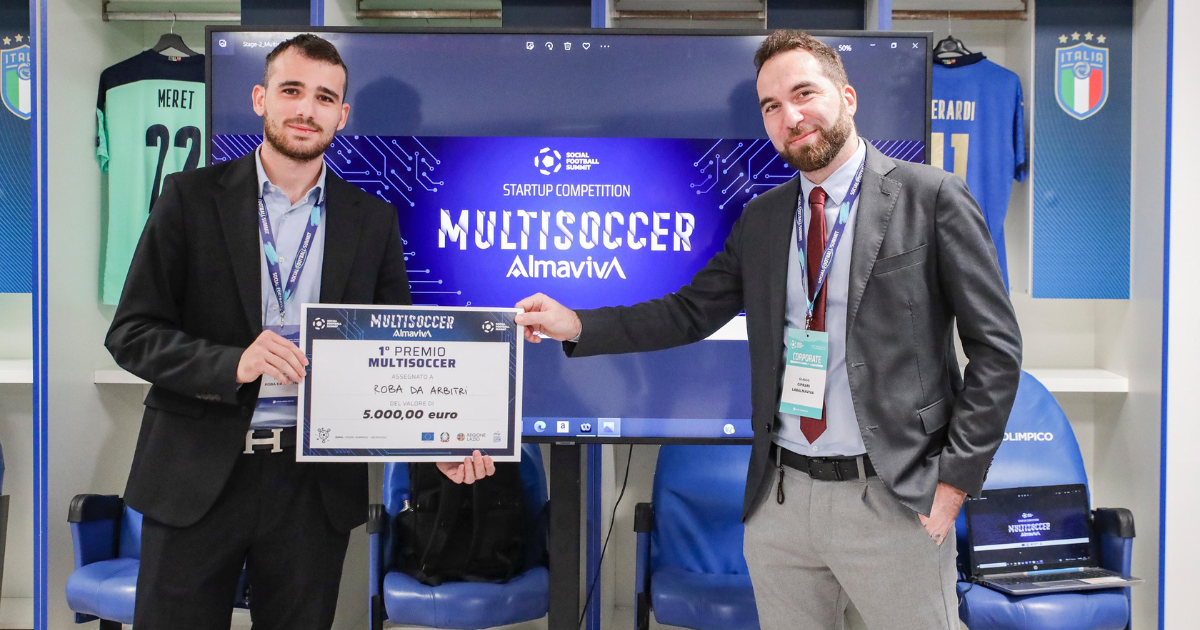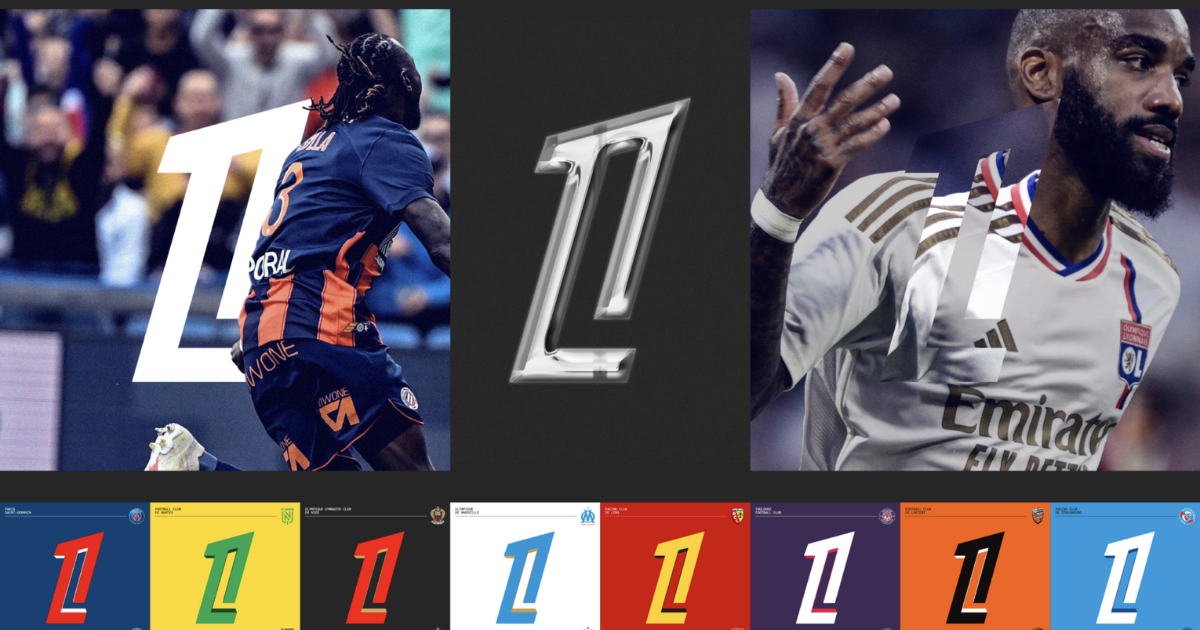Article by Yossi Segal & Márton Ferencz | Football Benchmark
Over the past decade, Atlético de Madrid has redefined its position in European football. On the pitch, the team has become a regular fixture in the UEFA Champions League and has consistently challenged Spain’s two giants for domestic honours. Under Diego Simeone’s stewardship, Atlético has reached two Champions League finals, won La Liga in 2014 and 2021, and lifted the UEFA Europa League and Super Cup, cementing its reputation on the European stage and becoming synonymous with tactical resilience and competitive ferocity.
Yet the modern Atlético story runs deeper than sporting performance. Off the pitch, the club’s revenue has grown from €170m in 2013/14 to €442m in 2023/24, while its Enterprise Value, as reported in Football Benchmark’s ‘The European Elite’ report, is estimated to have more than tripled over the past decade, rising from €592m in 2016 to €1.9bn in 2025.
It is, at its core, a case study in how consistent results underpin bold financial strategies, and how capital injections, sustained squad investment, and strategic infrastructure projects can combine to reshape a club’s trajectory. Atlético’s transformation is not the product of a single breakthrough but rather the accumulation of well-timed moves that have built a platform for sustained competitiveness.
Capital as the catalyst
An early decisive step in this journey came in early 2015, when Chinese conglomerate Wanda Group acquired a 20% stake in the club for around €45 million through a capital increase. This transaction was not only a symbolic statement of Atlético’s growing global appeal but also a critical injection of funds at a time when Spanish football was tightening its financial control framework.
The Wanda era, however, proved relatively short-lived. In 2017, Israeli businessman Idan Ofer’s Quantum Pacific Group entered the shareholding structure, initially acquiring 15% through a separate capital increase and subsequently purchasing Wanda’s remaining 17% stake in 2018.

In 2021, Atlético launched a €181.8 million capital increase at the holding level. As part of the process, US-based Ares Management entered the capital of Atlético HoldCo, the holding company encompassing all investments beyond Atlético de Madrid, acquiring roughly a third of its shares. That same year, LaLiga’s “Impulso” agreement with CVC Capital Partners channelled nearly €2 billion into the Spanish clubs for infrastructure, digital upgrades, and debt reduction. While Atlético gained access to short-term capital, it is important to note that the club will face future reductions in media revenues due to CVC repayments, a burden avoided by clubs such as Real Madrid, Barcelona, and Athletic Club, which opted out of the deal, in exchange for greater immediate liquidity.
Looking ahead, further capital investment is anticipated, with Apollo Global Management reportedly considering a significant stake in Atlético, which would serve as a catalyst for projects such as the club’s new sports campus, Ciudad del Deporte.
Across the decade, these successive transactions gave the club access to levels of capital that are rare outside the very top tier of European football. Crucially, this capital served as the scaffolding for a broader strategic plan, encompassing sustained on- and off-pitch investments to maintain competitive performance while driving the club’s transformation.
Sustaining competitiveness
Maintaining elite performance during periods of structural change is a challenge that many clubs underestimate. For Atlético, capital access was only part of the equation; the other was ensuring that the team on the pitch remained strong enough to guarantee UEFA Champions League participation and the revenue it brings.
The club’s transfer strategy over this period was defined by a pragmatic cycle: acquire high-calibre talent capable of delivering results immediately, integrate them into Diego Simeone’s demanding system, and, when market forces dictated, sell at premium valuations to Europe’s wealthiest clubs. High-profile departures such as Antoine Griezmann (Barcelona, 2019) or Lucas Hernández (Bayern Munich, 2019) generated significant income, which was reinvested into replacements and emerging prospects.
Over the decade, Atlético’s player trading model became a core component of its competitiveness, allowing the club to evolve without drifting into financial overreach.

The results speak for themselves: despite operating with a more frugal approach to player trading than Barcelona and Real Madrid, Atlético does more than merely compete with its domestic rivals. They regularly secure Champions League participation, challenge for domestic titles, and have built a reputation as one of Europe’s most difficult sides to beat. The stability this sporting success has provided formed the foundation upon which the club could embark on its most ambitious projects off the pitch.
Building the physical platform
Infrastructure development has been the most visible expression of Atlético’s transformation. The opening of the Metropolitano Stadium in September 2017 was both a symbolic and operational turning point. The move from the historic Vicente Calderón to a purpose-built, now 70,000-seat venue not only modernised the matchday experience but also delivered an immediate uplift in matchday revenue and hospitality capacity. The stadium has hosted major finals and international events, diversifying revenue streams and anchoring the club’s presence in the city’s sporting landscape.

This was followed in 2019 by the inauguration of the Ciudad Deportiva Atlético de Madrid training complex, designed primarily for the women’s first team and academy squads. Equipped with multiple pitches, a 2,700-seat stadium, gym, and accommodation facilities, it showcased Atlético’s commitment to youth and women’s football.
Now, the club’s attention has shifted to the most ambitious project yet: the Ciudad del Deporte. Located adjacent to the Metropolitano, this €800 million development will feature a high-performance training centre, a mini-stadium, multiple pitches, residential facilities for academy players, and a range of leisure and hospitality infrastructure. Groundbreaking ceremonies have already taken place, but financing remains the critical next step. If completed as planned, the Ciudad del Deporte will consolidate most of Atlético’s commercial and sporting operations in a single, state-of-the-art hub, aligning physical infrastructure with the scale of the club’s ambitions.
Expanding the sporting footprint
Parallel to its investment in infrastructure, Atlético has extended its reach beyond Spain’s borders, evolving into a small but strategic multi-club network. While early ventures, such as a minority stake in ATK in India’s Super League and RC Lens in Ligue 1, were exploratory and short-lived, later moves were far more decisive and majority-led.
In 2017, Atlético acquired a controlling interest in Atlético San Luis in Mexico’s Liga MX, securing a foothold in one of the world’s most commercially dynamic football markets. Three years later, in 2020, the club founded Atlético Ottawa in the newly created Canadian Premier League, owning it outright. Together, these ventures highlight Atlético’s strategic focus on the North American market, aligned with a long-term strategy to evolve into a global football group and grow overall value, rather than pursuing a short-term multi-club model centred on supplying talent to the first team.
A complex, ongoing project

Atlético de Madrid’s evolution over the past decade illustrates the complexity of building an elite football institution. Sporting success created the credibility to attract capital; that capital enabled sustained squad investment; and investment, in turn, underpinned infrastructure development and international expansion.
Diego Simeone recently captured this dynamic, noting:
“We have to keep following the path we’ve had since the beginning — taking it one match at a time, not straying from that, and looking to grow. The team has evolved enormously and needs to keep evolving at the same pace. In these years, the team grew more than the club, then the club caught up with the team, and afterwards the club grew more while the team didn’t. Now, the team needs to take another step to match the level the club has reached.”
His remarks highlight both progress and unfinished business, with squad value declining in recent seasons. Atlético’s rise has been far from linear, shaped by ownership changes and the ongoing challenge of sustaining elite performance. Yet today’s club is no longer the gritty underdog of a decade ago, but a globally minded organisation intent on standing alongside Europe’s giants.
Ultimately, Atlético’s story underscores the interplay of vision, discipline, and strategic agility, combined with robust capital investment, as essential ingredients for staying among football’s elite. Delivering on infrastructure projects and reinforcing squad competitiveness will be critical to maintaining that position.
By Football Benchmark
Atlético de Madrid’s transformation: A decade of capital, competitiveness, and global reach
Article by Yossi Segal & Márton Ferencz | Football Benchmark Over the past decade, Atlético de Madrid has redefined its position in European football. On the pitch, the team has become a regular fixture in the UEFA Champions League and has consistently challenged Spain’s two giants for domestic honours. Under Diego Simeone's stewardship, Atlético has reached two Champions League finals, won La Liga in 2014 and 2021, and lifted the UEFA Europa League and Super Cup, cementing its reputation on the
MAPPING SPORTING DIRECTORS: FOOTBALL DECISION-MAKER TRENDS ACROSS EUROPE’S “BIG FIVE” LEAGUES
Article written by Football Benchmark Sporting Directors have become increasingly visible in the discourse surrounding the summer transfer window, a period when their work moves into the spotlight. But their role extends far beyond player transfers. From squad building and recruitment to managing the academy pipeline and setting long-term sporting direction, Sporting Directors are now central to how clubs operate year-round. Seen as the strategic anchor of a club’s football department, they are expected to focus on long-term planning and sporting coherence. Yet
Player valuation update: The most valuable players in world football today
Analysis by Football Benchmark According to the latest update from Football Benchmark’s Player Valuation Platform, a record 21 players are now valued at over €100 million. Alongside this, the average value of the top 100 players has climbed since the Platform was launched (€77.6 million in 2019), hitting €87.2 million in June 2025. From Lamine Yamal’s remarkable rise to the top of the overall rankings to Hugo Ekitike’s valuation leap since February, the data reflects not just who’s most valuable, but how
THE 2025 COPPA ITALIA FINAL HIGHLIGHTS SUSTAINABILITY BEST PRACTICE
After the inaugural edition of the “Road to Zero” project in 2024, Lega Serie A, Sport e Salute, Roma Capitale and Roma Servizi per la Mobilità, with the support of UEFA, continued their commitment to sustainability during the 2024/2025 Frecciarossa Coppa Italia Final. The final hosted AC Milan and Bologna FC at the Stadio Olimpico in Rome on the 14th May 2025 and saw the implementation of several initiatives in alignment with last years’ “Road to Zero” ESG (Environmental, Social and Governance) framework. The “Road to Zero” ESG framework was
International Sports Justice Under Attack: Opinions from the EU Court of Justice
Article written by Carlo Rombolà As we enter 2025, if anyone still believes that sport — in the broadest possible sense — is limited to athletic performance or match results, it is time for a wake-up call. Such a mindset risks overlooking key elements, foremost among them: sports justice. From the Sinner case in tennis to the Brescia case in Italy’s Serie B football league — to mention only the most recent examples — sports enthusiasts can no longer rest easy until the results achieved
Bluenergy Stadium solar farm at the center of soccer’s first energy community
Press release published on the official website of theUdinese Calcio. An unprecedented sustainability and solidarity initiative comes to life around the 1.1 MWh/year photovoltaic park at Udine Stadium Udinese Calcio and Bluenergy Group's joint commitment to environmental and social sustainability takes an extraordinary new step today. As the two clubs announce the completion of work on the photovoltaic system housed on the roof of Bluenergy Stadium, a new project involving the Friuli Venezia Giulia region and society comes to life. THE ENERGY COMMUNITY "Energy
EA FC FUTURES joins Bundesliga Common Ground in creating more opportunities to play around the world
This article is available in its original and unabridged version on the official Bundesliga website. The Bundesliga and EA SPORTS have joined forces as part of EA SPORTS FC FUTURES initiative, making the most of the established Bundesliga Common Ground pitches to provide further benefit to local communities around the world. This partnership project aims to promote the revamp and continued utilisation of 4 community pitches located around the world. Starting with the sites in Brazil, Nigeria, Indonesia and Germany, each pitch
Football from a global perspective: strategies, challenges and opportunities of the new digital era
Football is undergoing an unprecedented transformation, extending into new markets and reaching fans around the world. In the SFS panel'Globalization of football: how football is expanding into new markets,' industry experts discussed the strategies, challenges and opportunities that are driving the globalization of the game. Speaking on stage, moderated by Didem Dilmen , Director Of Communications Comparisonator, were Carolina Tha, Country Manager ITA, ES, PT and CH SambaDigital, Lucas Bugter, Director of Business Development 433 and Nicole Pike,
Ref House, Refereeing 4.0: From SFS22 to the New Rules of the Game
Giuseppe Totaro and Rasoul Abdulzahra are two referees ready to revolutionize one of the most controversial categories, often at the center of debates and headlines in major media. We at SFS know them well: they were awarded during the 2022 startup competition when their creativity and innovative vision already stood out. Today, the spotlight is on them again, thanks to Ref House, an ambitious project now close to its big launch. We reached out to Giuseppe, who gave us an
“Football. But French”: The Ligue 1 Rebranding and the Challenge of Sporting Identity
French football has decided to change its look. With the launch of the "Football. But French." campaign, Ligue 1 has embarked on an ambitious rebranding operation aimed at redefining its positioning in the international football landscape. This is not just a new visual identity—it is a cultural statement. French football seeks to be distinctive, elegant, and authentic, without following the narratives set by other top European leagues. The New Visual Language of Ligue 1 One of the most striking changes is the



